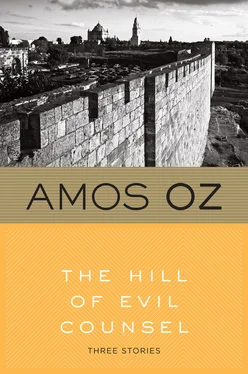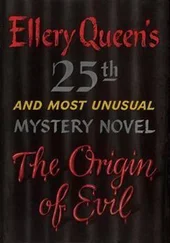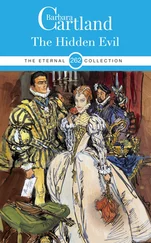The whole street came out to see Dr. and Mrs. Kipnis off to the May Ball at the High Commissioner's palace on the Hill of Evil Counsel.
Mitya the lodger stood grinning darkly on the doorstep of the house, his silhouette hunched with suffering, clasping a half-drunk glass of tea between his hands. He was chewing the point of his shirt collar, and his lips were mouthing something in the darkness, a curse or a premonition of disaster. The elderly professor Julius Wertheimer, keeping his place with his finger in a German edition of the New Testament, raised his hat slightly and said sadly, as if they were leaving on a long journey to another continent:
"Don't forget us."
Mrs. Vishniak the pharmacist waved them good-bye and good luck from where she sat on a wickerwork chair under the single Mandatory street lamp. Two tears hung from her painted eyelashes, because not long beforehand the announcer on "The Voice of Jerusalem" had said that times were changing and that things would never be the same again.
At the last minute, Engineer Brzezinski emerged on the other side of the road, slightly drunk and holding a huge electric lamp. He was a big-boned man with thick red hair and freckles. He was panting like a woodcutter and trembling with emotion. He thundered to them at the top of his voice:
"Just you tell them, doctor, tell them to their faces! Tell them to leave us alone! Tell them to go away! Tell them the White Paper is rotten! Tell them the whole country is getting more and more rotten every day! Tell them once and for all! And tell them that life as a whole is a rotten trick! Cheap! Miserable! Provincial! You let them know! And tell them that we, sam chort znayet, will never stop suffering and hoping until our last breath! Tell them!"
Suddenly he fell silent and pointed his great lamp furiously up at the dark sky, as if he were trying to dazzle the stars themselves.
Then the taxi choked, roared, and moved off in a cloud of dust.
The street was left to itself. Everyone had gone indoors. Only the square-paned street lamp continued to shed its forlorn light in vain. The wind blew. The fig tree ruffled its leaves and settled down. Its fingers were still empty. Dogs barked in the distance. It was night.
11
Lyubov Binyamina was a short, heavy girl with a swarthy complexion and a pointed chin. She looked like a plump, slow-moving, melancholy partridge. Only her lips were painted a bright scarlet. Her heavy bust forced out the front of her dress almost violently. There was always something slovenly about her appearance: a dangling button, a bad cough, a yellow oil stain on her Viennese-style dress. She wore clumsy brown orthopedic shoes, even around the house. She had thick down on her arms, and she wore a man's wristwatch. Hillel suddenly recalled the terrible things Mitya had said about the fellahin women going out alone at night to gather firewood, looking like hairy black she-goats. He bit his lip and tried hard to think of something else, but Binyamina kissed his ear lobe and called him "child poet," and he buried his face in the carpet and blushed to the roots of his curly hair.
Madame Yabrova, by contrast, displayed the somewhat threadbare remnants of a former grandeur. She spoke with a heavy emphasis, in long, emotional sentences, in a strong voice coarsened by the Simon Arzdt cigarettes she chain-smoked. She would rush around the room, furiously wiping her mouth, picking things up and putting them down again, and turning on her heel with a kind of clumsy agility, like an aging prima donna. She had a slight gray mustache and bushy black eyebrows. Hillel could not take his eyes off her double chin; it reminded him of the pelican in the 200 on Prophet Samuel Street.
Madame Yabrova had changed, as she did every evening, into a theatrical mauve velvet evening gown. She filled the room with a mingled smell of mothballs, baked fish, and eau de cologne.
After a few affectionate words, she suddenly released Hillel, silenced her niece with a hoarse reprimand, and exclaimed:
"Be quiet. We must both be quiet. The child has an inspiration."
They earned their living by giving private music lessons, one on the piano and the other on the cello. They sometimes traveled by bus to remote settlements to favor the pioneers with Friday-night recitals. Their playing was always precise and free from frills and graces, if a trifle academic.
Every available surface in their home was scattered with mementos: tiny ornaments, elaborately carved candlesticks, lumps of rock, handmade objects of wire and raffia, on the piano, the dining table, the coffee table, bronze busts including a glowering Beethoven, Oriental pots, plaster-of-Paris figurines, a china replica of Big Ben, dolls in motley national costumes, a copper Eiffel Tower, water-filled glass globes in which, when they were shaken or turned over, fake snow slowly fell on a rustic cottage or a village church.
One whole shelf was alive with woolly animals: polar bears, leopards, deer, centaurs, zebras, monkeys, elephants, all wandering hopelessly through a forest of green baize or dyed cotton wool. Every quarter of an hour a headless cuckoo popped out of the wall clock and emitted a sound resembling a hoarse bark.
Hillel was seated in a deep armchair surrounded by large philodendrons. Here he huddled in his gym shorts and cotton undershirt, with his legs tucked beneath him.
He thought about the fanatics, of whom Daddy had said that they thought they always knew best what was right and what was wrong and what ought to be done, and wondered in a panic whether Daddy and Mommy might not be secret fanatics, because they, too, always seemed to think they knew best.
Madame Yabrova said:
"If you promise me never to pick your nose, you may have a piece of marzipan after your supper. Lyubov, krasavitsa, put down that filthy novel of yours for a moment and pop into the kitchen to get some bread and butter and jam for our guest. Spassibo. "
Lyubov said:
"It's not a filthy novel, Auntie. It's nothing of the sort. It's true it's not exactly suitable for children, it's got all sorts of disasters and erotic scenes in it, but there's nothing dirty about it. And anyway, Hillel's almost a grown man. Just look at him."
Madame Yabrova snickered:
" Bozhe moi, Lyubov! Nothing dirty, indeed! Smut! Filth! That's all she has in her head. The body, Lyubov, is the purest thing there is in the whole world. Writers should write about love and suchlike with proper reticence. Not with all sorts of filth. Hillel is old enough, I can see, to know what is love and what is simply disgusting."
Hillel said:
"I don't like jam. I want some marzipan, please."
The room smelled dank and brown. In six vases of assorted shapes and sizes, last weekend's gladioli drooped and wilted. The windows were all closed to keep out the wind or the sounds of the night. Mommy and Daddy were far away. The shutters were closed, too. The curtains were drawn. Madame Yabrova was chain-smoking her Simon Arzdt cigarettes. The air was turning gray. She reached out to touch the child, who had glumly eaten half a buttered roll; she felt the muscles of his arm and exclaimed dramatically:
" Molodyetz! Soldatchik! "
Madame Yabrova put a record on the phonograph. Two suites for flute were followed without an interruption by an infectious dance tune. She kicked off her shoes and moved heavily around the room in her bare feet in time to the music.
Meanwhile, Hillel had consumed a soft-boiled egg from a chipped enamel mug, and rounded off his meal with a piece of marzipan. He played for a while with the glass globes with fake snowflakes. He was tired, drowsy, and miserable. He was suddenly seized with a vague apprehension.
Lyubov Binyamina Even-Hen came back into the room in a pink dressing gown. Her heavy, restless breasts were straining at the top button. Madame Yabrova switched on the lamp on the piano, which was. carved in the form of a blue nymph, and turned off the overhead light. The elaborate glass chandelier went dark, and so did the room. Drowsily Hillel let himself be fed a spoonful of plum preserve that tasted like sticky-sweet glue. Shadows played on the walls and the furniture. The two women came and went, whispering, exchanging secret giggles in Russian. Through his drooping eyelids, through the haze of cigarette smoke, Hillel seemed to see Binyamina slowly, painstakingly unfastening all the hooks and catches of her aunt's velvet dress. The two women seemed to be floating on the smoke and mingling with the blocks of shadow. They were seemingly dancing on the carpet, dancing and smoking in time to the music of the phonograph among the ornaments and figurines, one in a pink dressing gown and the other in a black petticoat.
Читать дальше











